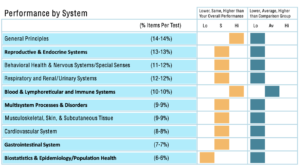USMLE Scoring: How Much Do a Few Points Matter?

2218 Views
Studying for USMLE Step 1 and Step 2CK can be stressful, how ambitious should your score goal be? How hard is it to get a passing Step 1 score? Will putting in the time to study for Step 1 help me reach my Step 2CK score goal? How well should you be scoring on practice exams before taking the real deal? What should my Step 2CK score goal be? Read on to find out!
How does USMLE scoring work?
USMLE scoring is a bit of a black box. We know approximately how many questions are on the exam and that’s about it. The USMLE website itself states that the score needed to pass can vary for every testing cycle. There’s a lot of interest in the Step scoring right now, because of the change to Step 1 Pass/Fail in the near future. The stress to do excellent on this exam is absolutely dissolved but beware of laying back and letting yourself get off track. I get a lot of questions from students asking, “how much work do I need to put in to just pass this exam”.
The thing is, “Just passing” this exam is not easy. It takes careful and deliberate preparation. I emphasize this because Step 1 scores are correlated with Step 2CK scores. Take a look at the scores of residents who matched into Internal Medicine, General Surgery, and Emergency Medicine. There are very few people who scored poorly on Step 1 and then rallied for Step 2. The majority of people did just about as well on Step 2 as Step 1.
I think the study habits that are used studying for the first USMLE exam carry over into the second, so it’s important to build effective and efficient study habits now. I was a very average student during my first year at the Indiana University School of Medicine. But, in my second year, I realized Step 1 was going to be a defining moment in my career (whether I took it seriously or not) and decided to give it my best shot. In the process of studying for it, I learned how to build a routine, study quickly but comprehensively, and work incrementally towards my goal. I ended up scoring in the 90th percentile and used these same study methods to then honor my Internal Medicine rotation as well.
Will those few points on the USMLE make a difference?
It depends. If you are applying to a very competitive specialty like Dermatology, you’ll see that the distribution of all residents is very tight. This means that if you don’t fit in with the pack, you don’t stand a very good chance of matching. Other specialties, like Family Medicine, Neurology, Obstetrics and Gynecology, and Psychiatry have very wide distributions, so the score you need for acceptance is a bit blurred. In these specialties, the question becomes more nuanced and difficult to answer: “What kind of program are you looking for — is it highly competitive? Academic? Small program? In a great city?”. So, it is easier to consider the question: “What score should I aim for to match into ________ this cycle” than “What score do I need to match into Emergency Medicine at UCLA?” when setting your score goal.
How to read your Step 1 and Step 2CK score report?
This touches on a theme in exam preparation: look at trends, not individual events. For example, perhaps in one block of 40 practice questions, you happened to be tested on 2 questions within Immunology, only one of them you answered correctly. Overall the block goes well, but as you are reviewing, you ask yourself, “How much immunology should I review?”. You got 50% of the immunology correct! But there were only two questions. Maybe the information you needed to answer the questions correctly wasn’t that high-yield.
If you have prepared well, it is to your advantage that Step 1 and Step 2CK are long exams. The amount of information that you need to cover as a medical student is enormous, so it makes sense that the exam should be long! With so many questions, it is unlikely that you will get unlucky and are asked questions on more than a few topics that you don’t know very well. A longer test means a score that is more representative of your knowledge.
NBMEs are just over half as long as the full-length Step 1 and Step 2CK exams. So, getting a few unlucky questions wrong has a much larger effect on your score, especially on the performance by system. So, when you are studying, do lots of practice questions, NBME’s, and pay attention to how your performance by system changes over time. Anticipate that there will be normal fluctuations. You are looking for consistent deficits in specific topics.
How to accept a score lower than your goal?
Not reaching your Step 1 or Step 2CK score goal can be disappointing. Ask yourself: What did you want to achieve? Were you willing to prepare diligently? What barriers did you have to overcome? And does your score really jeopardize your goal? What is the next opportunity to continue on your way to your goal? Standardized tests can help put your foot in the door, but an interview panel always asks themselves, “Do I want to work with this person? Will they get along well with our team? Do they have the skills and work ethic necessary to be successful here?”. If you are resourceful and have good guidance, you can bolster other areas of your application and make professional connections that move you towards your goal.
Featured Articles



